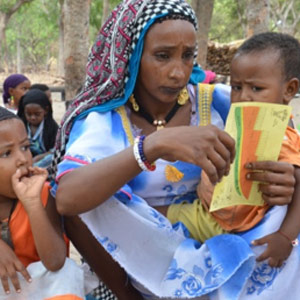In-country activities
Achieving Universal Health Coverage in Chad
Damien Revault
 Universal Health Coverage (UHC) is crucial to ensure that everyone has access to health services. The Swiss Agency for Development and Cooperation (SDC) and partners have implemented the PADS project in Chad to work towards making UHC a reality. A workshop was held from 2 to 4 May in N’Djamena to help achieve UHC.
Universal Health Coverage (UHC) is crucial to ensure that everyone has access to health services. The Swiss Agency for Development and Cooperation (SDC) and partners have implemented the PADS project in Chad to work towards making UHC a reality. A workshop was held from 2 to 4 May in N’Djamena to help achieve UHC.
Reaching vulnerable populations through Universal Health Coverage
In Chad, over 78% of the total population lives in rural areas. Accessing health services is difficult given long distances, a limited number of health centres, shortages of qualified health workers and insufficient medical equipment. Nomadic populations in particular suffer from the consequences of limited access to health services.
As one of the world's poorest countries, Chad is mobilizing international efforts to work towards achieving UHC. The Projet d'appui aux districts sanitaires du Tchad - Yao et Danamadi (PADS) aims to improve access to essential healthcare services specifically for vulnerable populations. "Quality and access are the door-openers for engaging communities, finding champions for health, and putting equity into practice." said Boukari Ouedraogo, coordinator of PADS at Swiss TPH.
Intersectoral collaboration to improve access to healthcare
An important aspect to achieving UHC is the synergies between the health sector and others. In the workshop on 2 to 4 of May in N’Djamena, national, regional and international stakeholders shared experiences and agreed on next steps to foster cooperation between sectors. "Intersectoral cooperation with the Ministries of Finances, Planning, Social Action and more is a key strategy of the Ministry of Health." said Djabar Hamid, General Secretary of the Ministry of Health in Chad.
An example of intersectorial collaboration is the PADS project, in collaboration with the Ministry of Health, which conducted a joint human and animal health campaign for mobile pastoralists together with the Ministry of Livestock. Joint campaigns in the spirit of a "one health" approach are valued by nomadic populations who depend on livestock. Since 2017, more than 20’000 children and women were vaccinated against Tetanus and typical childhood diseases and more than 50’000 cattle against pasteurellosis.
PADS - Reducing morbidity and mortality
The goal of PADS is to reduce maternal and child related morbidity and mortality with a focus on nomadic populations. PADS applies a systemic approach including governance, infrastructure, drug supply, health information system strengthening, capacity building and outreach services. The program is active at national level to inform evidence-based policy making.
The project is funded by the SDC and implemented by the Swiss Tropical and Public Health Institute (Swiss TPH) together with the Centre de Support en Santé Internationale (CSSI) and other local partners. The project contributes to Switzerland's involvement in the P4H Social Protection Network through SDC Global health program.
Contact person:
Damien Revault | damien.revault@swisstph.ch
Links to related resources
